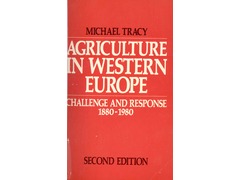Germany
Documents from [1807] to [1975]Identity Statement
6 files
Carr, Mary
Content and Structure
Feudalism was abolished by the agricultural reforms in Germany which were completed in 1848, however there was no great change in farm structures, basically peasants could own their own land but the financial burden involved, made it impossible for many.
The agricultural opinion from 1850-1870 due to prosperity was in favour of free-trade, however Bismark concluded a trade tready with France in 1860, but his reasons were mainly political, to protect Prussia's security. It was only when Germany began to feel the effects of foreign competition and with the support of industrialists that protectionism became more favoured and in 1885 the Reichstag raised duties on wheat and rye. Bismark was replaced by Caprivi in 1890 who initiated commerical treaties with other European countries, the Treaties were not popular and the Prussian landlords organised themselves in the Bund der Landwirte which demaned tariff protection and an end to commerical treaties. However nothing could be done till the time came for their renewal in 1902, in December 1902 the Government enacted a new tariff on grain and an import certificate system was also introduced. Such measures of protection adopted from 1879 onwards couldn't stop the effect on the German market of the fall in the world price on grain and in the 1890's they reached their lowest price. The depression in agriculture led many farmers to get out of farming, despite protective measures. It was really only the Junkers, who had established the Bund, who profited from the tariffs on grain, as only large farmers could sustain crop growth.
During the war Germany suffered more than Britain as she was blockaded. Increasing production was not an option due to the shortage of feedstuffs and fertilisers, lack of labour led to a fall in crop yields and livestock. The period up to 1925 seemed bad enough, the reintroduction of tariffs which were meant to restore the price of grains, however with no protection for livestock, agitation increased in rural areas. Prices fell again worldwide in 1929, so further measures were adopted to deal with the crisis, the increased duties and other methods of protection succeeded in bringing about a drastic reduction in imports of foodstuffs, which by 1933 were 62% of their level before the crisis. The crisis however brought a hugh drop in farm income, which coupled with the problem of farm indebtedness, made it easy for the National Socialist Party to take root there and take advantage of rural distress.
The National Socialists came to power with a clearly designed policy for agriculture formulated by Walther Darré, which guaranteed the farmer, intervention from the state and fair prices for his produce. For Hitler, the peasantry were important in holding the socialists at bay, yielding food and recruits for the military. Hitler encouraged greater food production and less reliance on imports. The NS's policies also gained support from the Junkers and in 1933 Hitler was appointed Chancellor. The main undertakings in argriculture taken by the Nazis' were: established corporate organisation of agriculture and agricultural markets (Reichsnährstand), import control and trade policy - control over imports was vested in the Reichsstellen (State Import Boards), protection of the family farm (Erbhöfgesetz), price and production policy, the battle of production was launched in 1934 (Erzeugungsschlacht). By 1939 all the necessary machinery was in place for the control of prices and supplies.
Conditions of Access and Use
Allied Materials
Notes
See Michael Tracy's book: Government and Agriculture in Western Europe 1880-1988, 3rd ed. (1989)
